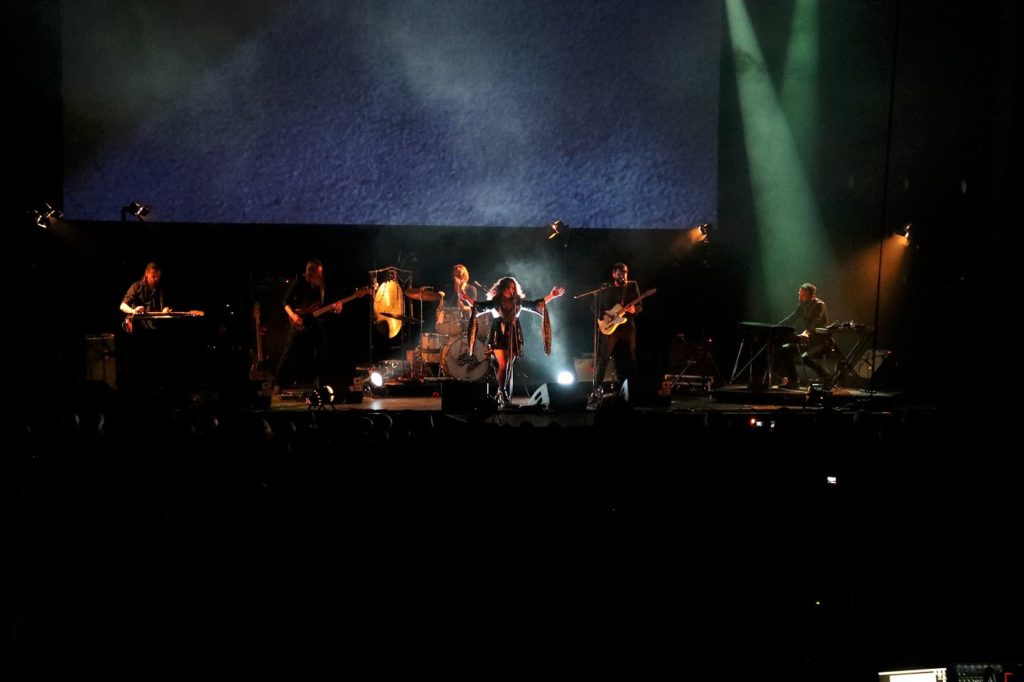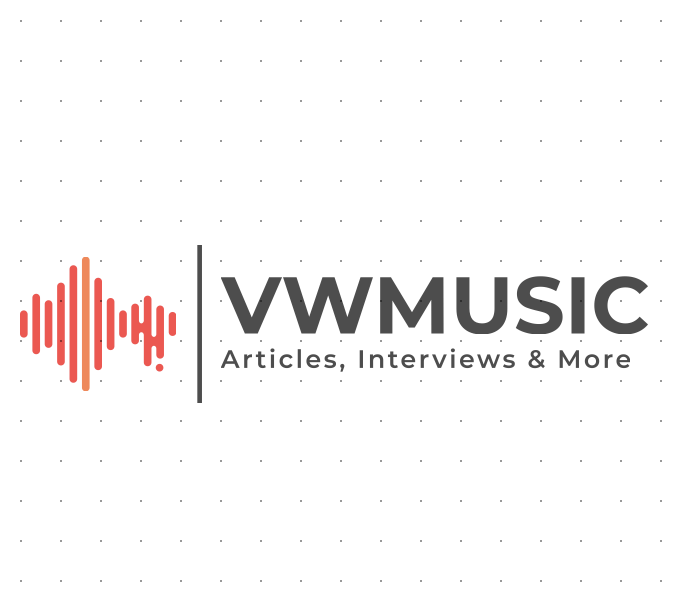
Metal is an interesting an expansive genre. As is often the case when it comes to music and genres, one band tends to beget the next. Though most bands are different, that is to say- they each have their own singular sound, if you look hard enough, you tend to find a through line from one to the next. Call it a family tree, if you will. Molassess is no different in this regard. Born out of the ashes of the now disbanded Devil’s Blood, Molassess certainly has its links to the past, but they are confidently pushing forward, while doing their own “thing.”
What I love about Metal is the passion and the culture. If you’re not a Metal head by trade, the aesthetic can be a bit jarring, if not alarming. Lots of black clothing, occult themes and vivid, ghostly imagery tend to permeate the genre, but once you dig in and dissect the thing, you will find Metal is a truly beautiful and sincerely artistic genre in its own right. The scene is absolutely loaded with some of the most passionate and dedicated fans you will ever meet. Some of music history’s most endearing and interesting figures have come out the Metal scene, in particular, the European Metal scene. One of the more recent players in that history is guitarist Oedes Beydals, formally of the Devil’s Blood, currently of the completely awesome, Molassess.
You guessed it. Today, I’ve got Metal master, Oeds Beydals “in the house” for an interview. Molassess has a new album out, which happens to also be their debut. It’s called Through the Hollow, and you can head over to the group’s Bandcamp and score a copy on vinyl here. So Metal heads, this one is for you. Oeds is an old school Metal rocker for the new age. Enjoy this one. Cheers.
Andrew:
Oeds, thank you so much for taking the time to talk to us. Tell us about your back story. How did you begin playing music? What was your musical gateway so to speak?
Oeds:
There was a lot of Classical music played in my house when I was young. I heard this warm and impressive sound, and it appeared to be a cello. After I had learned to recognize different instruments, I wanted to play it, so I started there at 4 years of age. When I was in my teens, I discovered heavy music Hardcore/Punk/Metal and learned to play guitar, and write songs mostly by ear. After that all became more serious, I decided I had to fully commit to guitar and music studies, and from there wrote, recorded and toured extensively with multiple bands.
Andrew:
Molassess originated in the Netherlands. How did you get together? Europe has such a burgeoning Metal scene in general, right? What’s the Metal scene like in the Netherlands?
Oeds:
Our musical friendships are way broader then just Metal musicians. Most of us know each other mostly from our time in The Devil’s Blood, and our keys player and drummer (who live on the other side of the country) we have been fans of by seeing them play in their earlier bands.
Andrew:
I was a fan of The Devil’s Blood and was sad to see the band meet its end. That being said, when I saw that you had a new equally fantastic project in Molassess, I was truly excited. Tell us more about how Molasses got started.
Oeds:
Walter from Roadburn Festival stepped in at the perfect moment to ask us to create one-and-a-half hour of original music. It felt like it was meant to be because everyone involved was at a crossroads, and ready to do something new. So it all went fast from there.
Andrew:
It’s been made very clear that Molassess is not a continuation, or a replacement for The Devil’s Blood, but a completely new beginning. Why was that distinction important to you?
Oeds:
People tend to forget about the evolution everyone involved has gone through; after Devil’s Blood, we also played with The Enemies. I have been in different bands for years after etc. Also, you need to take the space to create, and it can be a burden that people have all these expectations that are miles apart from what is actually happening.
Andrew:
Before your time in The Devil’s Blood, and Molassess, you had very deep roots in the Amsterdam Punk Rock scene. How has that informed your music throughout your career?
Oeds:
The Punk scene in those days in Europe was very fruitful. We could tour all around Europe at 15 years of age. And organizing everything yourself in that way was the best way to learn how to survive as a band, and not just be a pawn of the industry. Later, I did feel a bit restricted by it like with most “scenes,” and change was necessary. The chance to play music with The Devil’s Blood put all the pieces together.
Andrew:
Molassess is a great name for a band. Why did you choose Molasses as the title of the project?
Oeds:
It is a song by Selim and His Enemies, and one of the later songs Farida worked on with Selim, her brother and founder of The Devil’s Blood. It catches the feel of our band symbolically and musically very well.
Andrew:
You have a long-term association with Roadburn Festival. For our readers who aren’t familiar with it, Roadburn Festival is an international festival featuring all genres of Metal. What are your thoughts on Roadburn, and why do you feel it’s important?
Oeds:
It has been a very progressive platform, and gives space for things to grow in many directions. Something that is very important if you want to create freely. Most other festivals are curated in a more commercial way where there is not so much attention for the art itself.
Andrew:
Listening to Mourning Haze Drops of Sunlight, I get some Uriah Heep and Scorpions vibes. Is Molassess influenced by those bands as all? What other bands are you influenced by?
Oeds:
We all love the 70’s Rock bands a lot. Every band we have been in has played important roles in where we go musically, and all of our very different musical pasts. I think we try to not be dogmatic about what is thrown into the mix. Anything from Roky Erickson to Magma, Coltrane Penderecki and Hawkwind just to mention some.
Andrew:
In the past, a lot of your music has a through line of occult themes in the vein of bands like Black Sabbath and Coven. What is it about the occult that interests you?
Oeds:
The many tools to get to creation is something I find is highly useful when looking at some of the knowledge out there. Music is our weapon of choice and is in itself a very mystical endeavor, sometimes the language of the subconscious if done right.
Andrew:
In my opinion, you’re one of the better guitarists in Metal today. Who are you biggest influences as a player?
Oeds:
Thanks! Starting with Dr. Know from the Bad Brains, Pig Champion from Poison Idea. Later on John Mclaughlin, Buck Dharma and Robert Fripp. But I can’t not mention Selim Lemouchi.
Andrew:
A lot of people try to define what it means to be “Metal.” What are your feelings on that?
Oeds:
I think they should stop worrying about these type of definitions. It usually only creates boundaries and limits for yourself and others possibly.
Andrew:
Molassess is a bit hard to pin down genre wise, and that’s in no way a bad thing. People like to put bands in boxes, though. What are your thoughts on the idea of genres in general?
Oeds:
I always think genres are needed for the people that sell the music and because I’m in the business of creating it, I tend to not pay a lot of attention to that. Although sometimes when looking for something specific it can help to find the right direction.
Andrew:
Do you collect vinyl? Tapes? CDs? Or are you all digital now? If so, what are some albums that mean the most to you? Where do you like to shop for music?
Oeds:
I cant say I’m a real vinyl collector, but that is mostly a financial problem haha. It is still the coolest medium for music, I think. The whole piece of art gets the most respect in that way. I really love some of my early Hardcore 7’’ by Discharge; they give me this feeling of being in a time machine. Also the Captain Beyond s/t record from the 70’s is one that I had been looking for for some time, and then got from a friend. Most of the records that I got as of late were the things I played on myself. Just yesterday, I received the new Molassess double vinyl which is a great feeling as well. There are quite some good record shops in Amsterdam also for second hand stuff. That’s where I tend to search for stuff.
Andrew:
What type of guitars and gear are you using these days compared to the past?
Oeds:
I started using Gibson SG’s and big 4×12 cabs and Marshalls/Orange, but as the music became more complex, I needed more definition and less decibels overall. So, I started looking into more Fender style amps and guitars. That’s what I play mostly now, Jazzmaster/Telecaster and a custom 9 string guitar built by my friend Thijs Pichel.
Andrew:
Is there anything about the music industry in general that you would like to see change? Anything that would benefit both the fans, and the artists?
Oeds:
So much has changed in a short time, that things that used to be “industry standard” were so under very different circumstances. The ways that bands can make money are still getting smaller and smaller, and the way the money is divided sometimes is still the same as in the 90’s. We should all look to change and give the youth space to create. It was also because we created opportunities when we were young we got to this point. But I feel it’s getting harder to create them.
Andrew:
Last question. Has today’s musical landscape changed for better or worse? Are there any bands out there that you think are carrying the torch? What advice do you have for young musicians trying to get their start?
Oeds:
I see many good upcoming artists in whatever style. I hope the young musicians will claim their space, and start some much needed chaos around here. Build something for themselves. As of now, cultural spaces are getting less room even before the pandemic this was already a problem. Let’s hope it doesn’t get worse.
Interested in sampling the music of Molassess? Check out the link below:
Dig this interview? Check out the full archives of Vinyl Writer Interviews, by Andrew Daly, here: www.vinylwritermusic.com/interviews
